According to GCV Analytics, in October, the number of corporate-backed deals from around the world stood at 476, up 45% from the 323 rounds from the same month last year. Investment value stood at nearly $25.95bn in total estimated capital – more than double the $11.73bn of October 2020. The US came first in the number of corporate-backed deals, hosting 191 rounds, while Japan was second with six and China and India – third with 34 each.

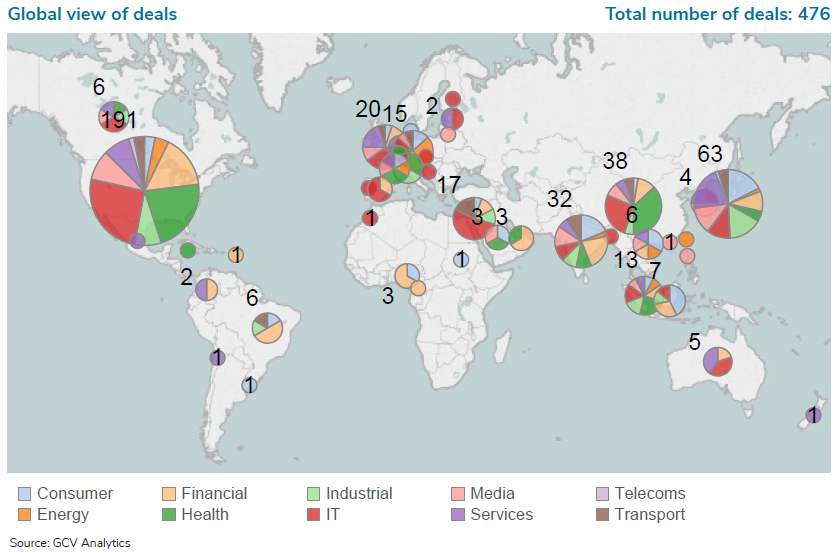
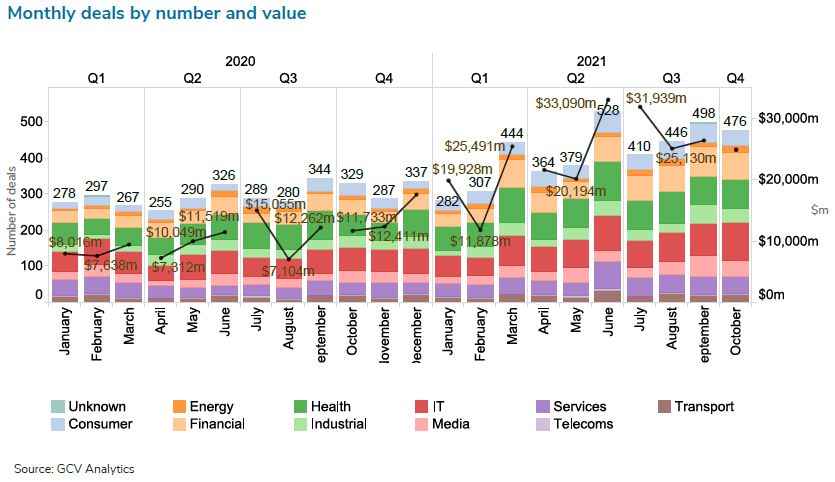
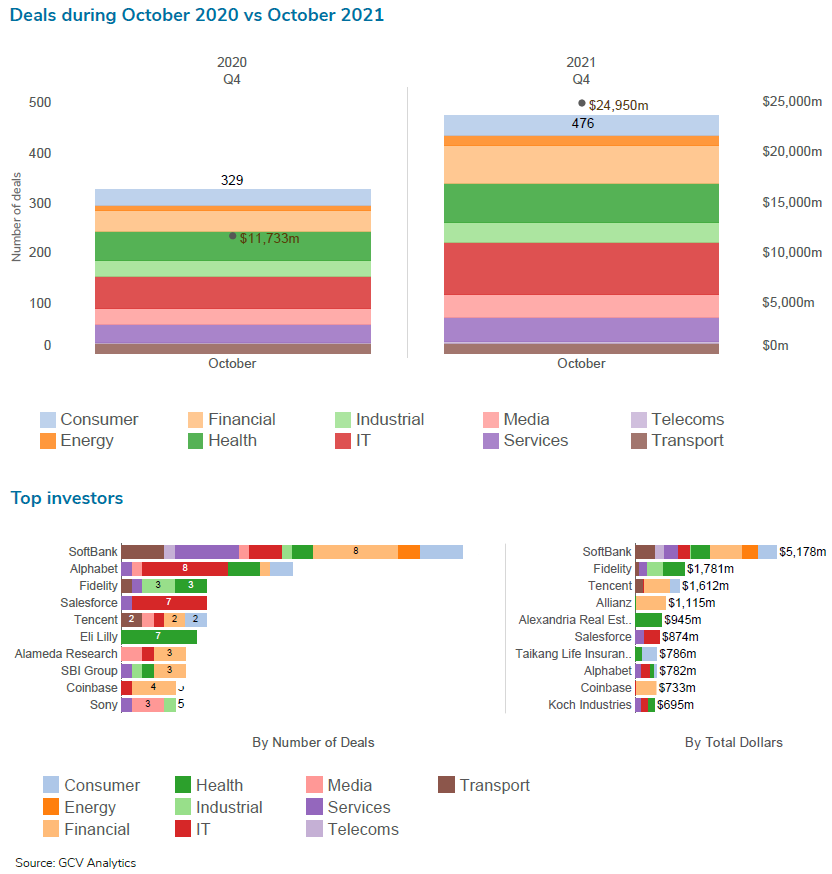
The leading corporate investors by number of deals were telecoms and internet conglomerate SoftBank, diversified internet conglomerate Alphabet as well as investment and financial services group Fidelity. In terms of involvement in the largest deals, Softbank and Fidelity were on the top of the list along with internet company Tencent.
GCV Analytics reported 24 corporate-backed funding initiatives, including VC funds, new venturing units, incubators, accelerators and other. This figure was 29% lower than the one from October 2020, which had registered 34 such initiatives. The estimated capital stood at $2.35bn, nearly 28% lower than the $3.25bn from the same month last year.
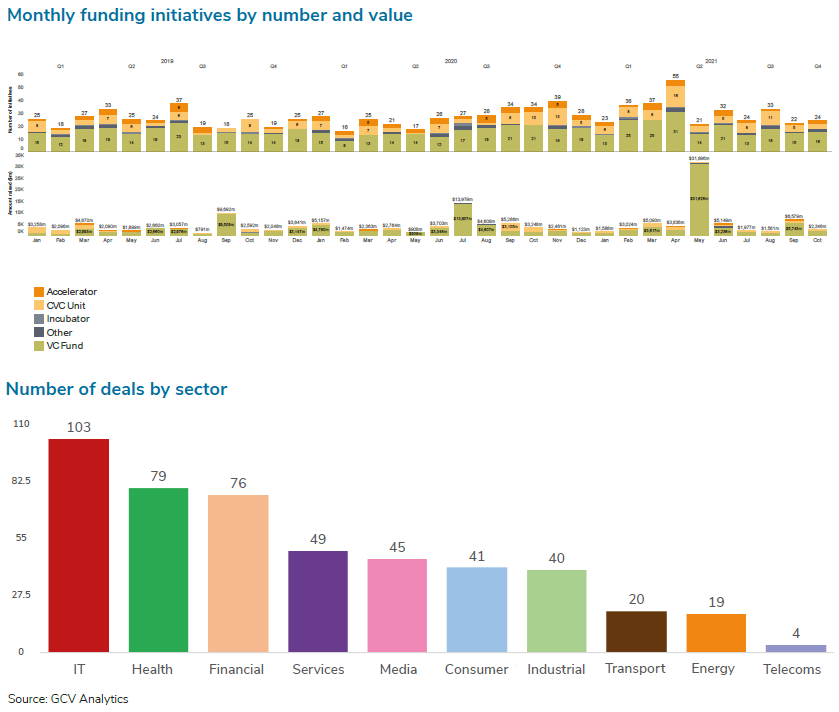
Deals
Emerging businesses from the IT, financial, health, financial and services sectors led in raising the largest number of rounds in October 2021. The most active corporate venturers came from the financial, IT, media and industrial sectors, as shown on the heatmap.

Germany-based digital bank N26, which counts Tencent and insurance provider Allianz as backers, raised over $900m in series E funding, at a valuation of more than $9bn post-money. Third Point Ventures, the venture Capital arm of investment adviser Third Point, led the round and was joined by Coatue Management, Dragoneer Investment Group and unnamed existing investors. N26 operates a mobile bank through an app which offers fee-free card payments around the globe and push notifications for transactions. It is currently on track to process $90bn in transaction volume for 2021 and is planning to hire 1,000 new staff.
Nezha, an electric vehicle (EV) subsidiary of China-based automotive manufacturer Hozon Auto, raised RMB4bn ($625m) in a series D1 round led by cybersecurity technology provider Qihoo 360 Technology.CCB International Asset Management, Citic Securities, GF Venture Capital and Shenwan Hongyuan Securities’ New Energy Industrial Fund filled out the round, which was reportedly secured at a post-money valuation of $4bn. Qihoo 360 invested about $313m through the round and now holds a 16.6% stake in Nezha as its second largest shareholder. Founded in 2014, Hozon is working on artificial intelligence algorithm-powered automotive technology. It launched its first mass-produced EV model, dubbed Nezha N01, in 2018, and the second and third iterations, Nezha U and Nezha V, in March and November 2020 respectively.
China-based smart consumer product manufacturer Dreame Technology secured $536m in a series C round featuring electronics manufacturer Xiaomi and real estate developer Country Garden. Huaxing Growth Capital and CPE co-led the round, which included Taikang Asset Management – on behalf of insurer Taikang – Yunfeng Capital, Stoneylake Asset Management, Skywalker Capital, Harvest Capital Management, Fortune Capital, Shunwei Capital and IDG Capital. Country Garden invested through corporate venturing subsidiary Country Garden Venture Capital, and the round followed a $14.6m series B round in September 2020 led by IDG Capital that also featured Xiaomi, Edge Ventures, Shunwei Capital and Peak Valley Capital. Founded in 2015, Dreame produces intelligent household appliances such as vacuum cleaners and connected mops. It will use the funding to grow its team and develop its technology.
Neumora Therapeutics, a US-based developer of brain disease treatments, collected more than $500m in a series A round that included $100m from pharmaceutical firm Amgen. SoftBank’s Vision Fund 2 also took part in the round, as did life sciences real estate investment trust Alexandria Real Estate Equities, through venture capital arm Alexandria Venture Investments. The round was led by Arch Venture Partners and also backed by investment and Fidelity’s F-Prime Capital unit, among many others. Founded in 2020 and launched last week, Neumora has developed a data science platform for neurodegenerative and neuropsychiatric disorders that is designed to define and classify patient subtypes by analysing the mechanisms that drive brain diseases.
FTX Trading, the Bahamas-registered cryptocurrency exchange backed by SoftBank, payment technology provider Circle and crypto exchanges Coinbase and Binance, raised approximately $421m in series B-1 funding. The cash was supplied by 69 investors including Ontario Teachers’ Pension Plan Board’s Teachers’ Innovation Platform, BlackRock, Temasek, Sequoia Capital, IVP, Iconiq Growth, Tiger Global Management, Sea Capital, Ribbit Capital and Lightspeed Venture Partners. Founded in 2019 and incubated by quantitative trading firm Alameda Research, FTX runs a cryptocurrency exchange platform, and said its user base has grown by 48% and its average daily trading volume 75% since July this year, averaging $14bn daily. The funding will help the company further develop its activities in areas such as equities, prediction markets, video game partnerships and non-fungible tokens. Its valuation increased to $25bn in the round.
SoftBank’s Vision Fund 2 paid $400m for a 10% stake in US-headquartered activewear brand Vuori. Founded in 2015, Vuori produces clothing tailored for exercise and outdoor activity and its designs are based on a US West Coast aesthetic. The SoftBank investment will fund a domestic expansion drive expected to result in more than 100 retail stores being opened in the next five years, in addition to an international expansion that will involve Vuori entering the Western Europe and Asia Pacific regions. The deal marked the second time the company has raised external funding, the first being a $45m investment by venture capital firm Norwest Venture Partners in August 2019.
Celsius Network, the US-based cryptocurrency services platform developer backed by stablecoin issuer Tether International, received $400m in funding at a valuation in excess of $3bn. The round was co-led by growth equity firm WestCap and fund manager Caisse de dépôt et placement du Québec (CDPQ). Founded in 2017, Celsius runs an online blockchain-based platform allowing users to take out dollar-denominated loans from other members of its community at a low cost through cryptocurrency-denominated financing accounts. Funding will be used to launch new products for institutional customers and more than double the size of the company’s team to 1,000. It also plans on growing its footprint through strategic acquisitions.
E-commerce group JD.com led a $400m round for China-based lift advertisement service XinChao Media Group. Internet technology group Baidu also took part in the round, which made JD.com the largest XinChao shareholderand which valued the company at more than $2bn. The deal represents JD’s first sizeable investment after Hu Zhengwei, formerly executive director at investment firm Warburg Pincus, replaced JD vice-president Hu Ningfeng (Jason) as head of strategic investment. Founded in 2007, XinChao provides smart screen-based marketing campaigns targeting middle-class families, displaying adverts in more than 650,000 elevators across 105 Chinese cities. Brands can leverage its technology to distribute different ads based on information including lift users’ location and building labels.
US-based care management software provider Honor Technology closed a $370m series E round that included Prosus Ventures, a corporate venturing vehicle for internet group Prosus. Investment manager Baillie Gifford led the $70m equity portion of the round, which included Andreessen Horowitz, FMZ Ventures, Lighthouse Capital Markets, Rock Springs Capital, Thrive Capital, TriplePoint Capital, funds and accounts advised by T Rowe Price, and private investors Paul and Lori Hogan. The $300m debt portion was led by Perceptive Advisors and it was joined by Ares Management funds. The round took the company’s total equity funding to $325m and valued it at $1.25bn. Founded in 2014, Honor has created a workforce management software platform dubbed the Honor Care Network which is designed to help homecare agencies across some 800 US cities and towns provide non-medical assistance services.
ABL Space Systems, a US-based satellite launch vehicle developer, which counts aerospace and defence manufacturer Lockheed Martin among its backers, expanded its series B round to $370m. The $200m extension was provided by unnamed existing investors. The round valued ABL at $2.4bn. The original $170m came from participants including investment and financial services group Fidelity and funds and accounts advised by T Rowe Price in March 2021 at a reported $1.3bn valuation. Founded in 2017, ABL has developed launch vehicles designed to take small satellites to space at relatively low cost. The company claims to have active contracts with 14 customers across the defence, intelligence, commercial and science sectors.
Exits
GCV Analytics tracked 60 exits involving corporate venturers as either acquirers or exiting investors in October. The transactions included 42 acquisitions, nine initial public offerings (IPOs), eight other transactions (reverse mergers with SPACs) and one merger.
The exit count was considerably above the October 2020 figure (38). The total estimated exited capital stood at $11.1bn, 45% higher than the same month from last year ($7.67bn).
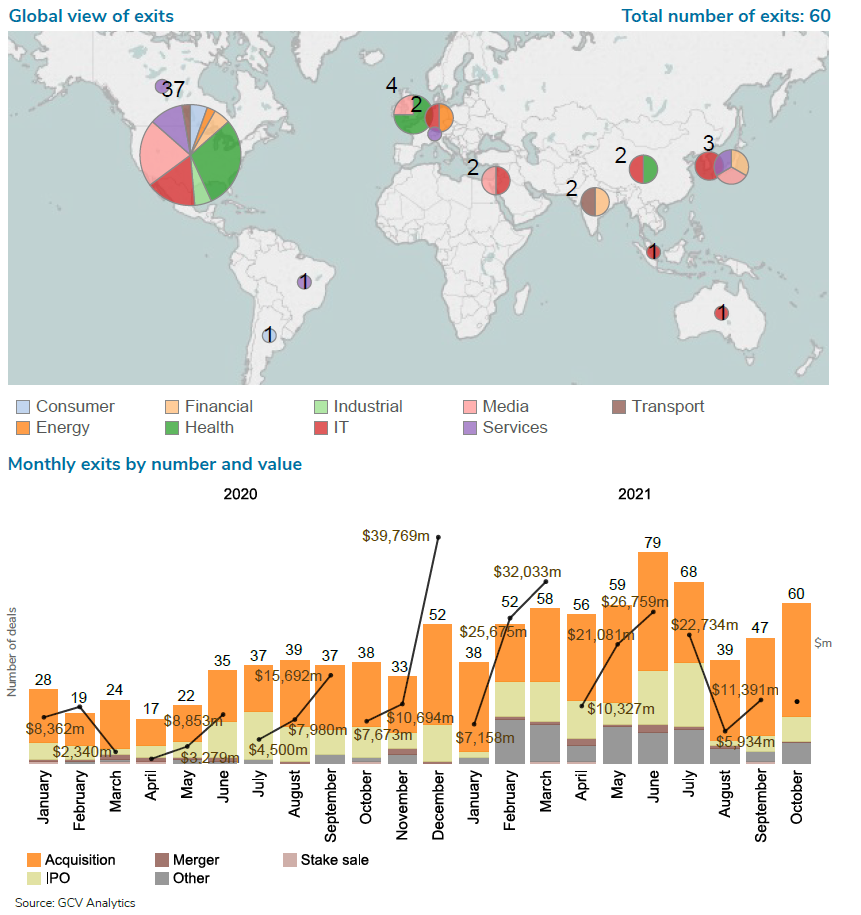
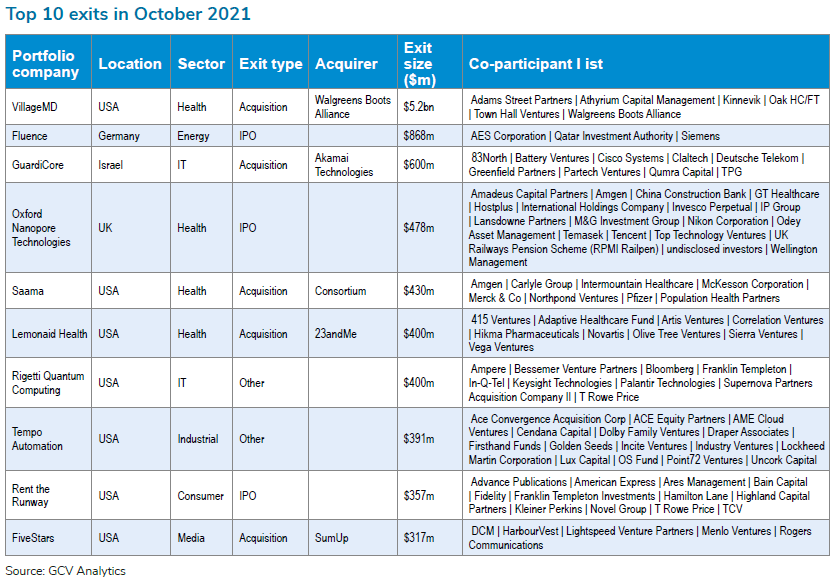
Pharmacy operator Walgreens Boots Alliance (WBA) paid $5.2bn to increase its stake in US-based primary care provider VillageMD from 30% to 63%. VillageMD operates a network of 230 primary care services providers across 15 US markets under the Village Medical brand. The company will use the proceeds to speed up an initiative to open at least 600 co-located Village Medical at Walgreens outlets by 2025 across 30 US markets, with 1,000 planned by 2027. It also plans to carry out an initial public offering next year. WBA made an initial $250m investment in VillageMD in July 2020, at the time pledging a total of $1bn in equity and convertible debt financing over the next three years – the precise mix of which was not disclosed – to gave it a 30% stake.
Fluence, the Germany-headquartered energy storage technology producer co-founded by energy utility AES and industrial technology and appliance provider Siemens, closed its IPO at just over $998m. The company had raised an initial $868m in the offering last week, issuing 31 million shares priced at $28.00 each. Those shares have since risen to $35.32, leading the underwriters to buy another 4.65 million shares for a total of $130m. Formed by the corporates in 2018, Fluence produces modular battery-based storage systems for use with renewable energy installations such as solar plants or wind farms. Its IQ Digital Platform software meanwhile helps users get the best price for their energy through automatic bidding and price prediction tools.
Content delivery network services provider Akamai Technologies agreed to buy Israel-based cybersecurity technology developer Guardicore for about $600m, providing exits for corporates Deutsche Telekom, Access Industries, Dell and Cisco. Founded in 2013, Guardicore operates an online security software platform that helps businesses to manage and protect data held in cloud-based, hybrid or traditional digital infrastructure. The company’s platform can also protect against and address ransomware attacks. Guardicore is expected to add about $30m to $35m in revenue to Akamai’s books for the 2022 fiscal year.
Oxford Nanopore, the UK-based DNA sequencing technology developer backed by corporate investors Nikon, Tencent, Amgen and Illumina, went public in a $478m IPO on the London Stock Exchange. The company issued 82.4 million shares priced at £4.25 ($5.81) each, securing a valuation of $4.7bn, while shareholders including commercialisation firm IP Group offloaded $238m worth of stock. Software producer Oracle had already committed to being a cornerstone investor for the IPO, putting aside $205m last week. Oxford Nanopore’s shares soared 45% on the first day of trading and at time of publication its shares are trading at £6.26 each. Founded in 2005, Oxford Nanopore provides DNA and RNA sequencing technology that allows users to generate analysis in real time. The technology has been applied to a wide range of products ranging from handheld devices to population-scale platforms.
A consortium that includes several corporate venturing units have combined to pay $430m for a majority stake in US-headquartered clinical software provider Saama Technologies. Private equity firm Carlyle led the deal, which also featured pharmaceutical firms Amgen, Merck & Co and Pfizer, health system Intermountain, medical product distributor McKesson, Northpond Ventures and Population Health Partners. The corporates invested through respective subsidiaries Amgen Ventures, Merck Global Health Innovation Fund, Pfizer Ventures, Intermountain Ventures and McKesson Ventures. Saama has built a cloud software platform which manages and analyses data from clinical trials, on behalf of pharmaceutical and biotech product developers.
Consumer genetics testing service 23andMe agreed to acquire US-based online healthcare provider Lemonaid Health in $400m deal which would provide exits for pharmaceutical firms Novartis and Hikma. A quarter of the purchase price will be paid in cash while the remaining 75% will be in 23andMe stock. Lemonaid’s co-founder and chief executive, Paul Johnson, will become general manager of 23andMe’s consumer business and continue to run Lemonaid’s services. Founded in 2014, Lemonaid provides an online platform where users can virtually see physicians and get treatment and medication for a range of illnesses such as diabetes, high blood pressure or asthma, or access mental health services.
Rigetti, a US-based quantum computing technology developer that counts media group Bloomberg as an investor, agreed a reverse merger with special purpose acquisition company Supernova Partners Acquisition Company II. The deal gives Rigetti a pro forma valuation of approximately $1.5bn and the merged business, Rigetti Computing, will get the New York Stock Exchange listing taken by Supernova in a $300m initial public offering in March this year. Measurement equipment producer Keysight, data analytics provider Palantir and fabless chipmaker Ampere Computing are contributing to a private placement sized at over $100m supporting the deal, along with T Rowe Price, Bessemer Venture Partners (BVP), Franklin Templeton and In-Q-Tel. Founded in 2013, Rigetti is working on scalable, error-corrected quantum computers and has built a dedicated quantum chip foundry it claims is a world first. The company has also created a platform to run quantum computing applications in the cloud, and markets software to facilitate hybrid quantum-classical computing applications.
Tempo Automation, a US-based industrial software developer backed by aerospace technology producer Lockheed Martin, agreed a reverse merger with special purpose acquisition company Ace Convergence Acquisition Corp. The deal gives the company an implied equity value of approximately $919m and the combined entity, Tempo Automation Holdings, will get the Nasdaq Stock Market listing taken by Ace in a $200m initial public offering in July 2020. Point72 Ventures Investments and ACE Equity Partners are anchoring an $82m private investment in public equity financing supporting the transaction, investing alongside Firsthand Funds and Lux Capital. The company will use $391m in gross proceeds to acquire PCB producer Advanced Circuits and electronics manufacturing services group Whizz Systems, inject money into its balance sheet and settle payments related to the transaction. Founded in 2013, Tempo has created an automation tool that helps printed circuit board (PCB) components accelerate their manufacturing process.
US-based fashion rental service Rent the Runway went public in a $357m IPO representing an exit for backed by media group Advance Publications and payment services firm American Express. The company increased the number of shares in the offering from 15 million to 17 million and issued them on the Nasdaq Select Market priced at $21.00 each, at the top of the IPO’s $18 to $21 range. Founded in 2009, Rent the Runway runs an online-based service that enables women to lease clothing pieces, accessories and home decor, paying either per item or through a subscription that gives access to a set or unlimited number of items, depending on the selected price. It has 11 million registered users and also operates five retail stores. The company had disclosed $553m in funding pre-IPO, most recently securing $81.2m in a May 2021 series G round that included Ares Corporate Opportunities Fund, Highland Capital Partners, Bain Capital Ventures and TCV.
Payment services provider SumUp agreed to acquire FiveStars, a US-based integrated payment processing and marketing platform developer backed by telecoms and media company Rogers Communications, for $317m. The acquisition comprises an unspecified mix of debt and equity and is intended to help UK-headquartered SumUp expand its business on either side of the Atlantic. Founded in 2010, FiveStars operates a software platform that brings together a point-of-sale system with payment processing and automated marketing tools including personalised messaging and loyalty programmes for small businesses.
Note: Monthly data can fluctuate as additional data are reported after each issue of GCV magazine goes to press